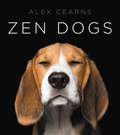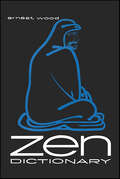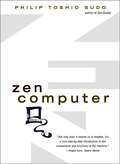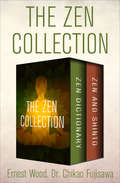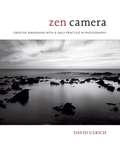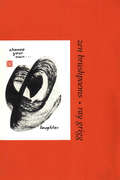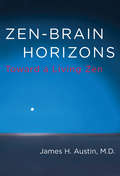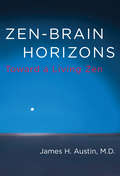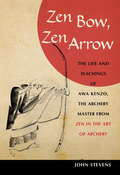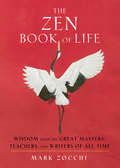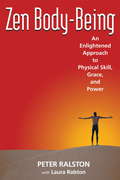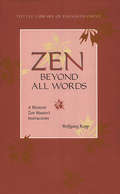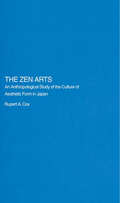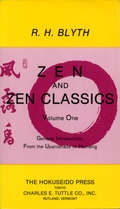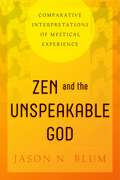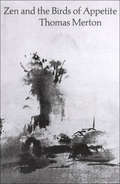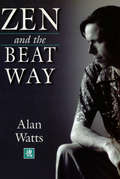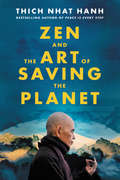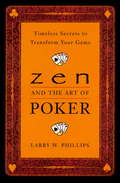- Table View
- List View
Zen Dogs
by Alexandra CearnsAward-winning animal photographer Alex Cearns celebrates the peace, calm, and joy dogs bring to our lives with this unique full-color collection capturing eighty dogs in their most relaxed and contented moments.When Alex Cearns caught Suzi the Sharpei on film with eyes closed and an endearing smile on her furry face, the renowned Australian professional pet and wildlife photographer called the picture of serenity "Zen Dog." Captivated by the image's tranquil beauty, Cearns then turned her lens on other canines experiencing their own carefree and meditative "Zen" moments--a series of photos that would go viral across the web and take the top prize in a major international competition.Expanding on Cearns's original web series, Zen Dogs includes eighty stunning color photographs of a variety of breeds--golden retrievers, beagles, French bulldogs, dachshunds, poodles, huskies, pit bulls, and German shepherds. Here are some familiar faces from the online series, joined by dozens of dogs never seen before--all whose engaging personalities shine through. Sprinkled throughout the photos are words of wisdom from the Buddha, Eckhart Tolle, Thich Nhat Hanh, and other meditative masters, inspiring messages that, with the photos, warm the heart and soothe the spirit.A gorgeous compendium for every dog lover, animal enthusiast, and everyone looking to add some peace and joy to their day, Zen Dogs reminds us of the power dogs have to enrich our lives--to make us happier, healthier, calmer, and more loving.
Zen Dictionary: Zen Dictionary And Zen And Shinto (Pelican Ser.)
by Ernest WoodA helpful A-to-Z guide to the terms, central concepts, and history of Zen Buddhism by the acclaimed scholar and author of Concentration. From the seemingly unlimited field of knowledge and sayings by Zen masters, theosophist Ernest Wood has carefully compiled a reference guide that details the most important Zen ideas, along with a general history of the growth of Zen in China and Japan. Presenting names and terms in alphabetical order, Zen Dictionary is an ideal reference text for any student of Zen. From the seemingly unlimited field of knowledge and sayings by Zen masters, theosophist Ernest Wood has carefully compiled a reference guide that details the most important Zen ideas, along with a general history of the growth of Zen in China and Japan. Presenting names and terms in alphabetical order, Zen Dictionary is an ideal reference text for any student of Zen.
Zen Computer
by Philip Toshio SudoJapanese-American musician Sudo (</Zen Guitar/>) assumes the reader has just acquired a new piece of software and needs to learn how to install and use it. Drawing from eastern philosophy, he sets out seven principles to avoid frustration: Expect the unexpected. It always takes longer than you think. Do not waste time. Learn and teach, teach and learn. Warm heart, cool head. Do good work. and Know when to turn the machine off. He has not indexed his series of short articles. Annotation c. Book News, Inc. , Portland, OR (booknews. com)
The Zen Collection: Zen Dictionary and Zen and Shinto
by Ernest Wood Dr. Chikao FujisawaTwo classic texts essential to understanding Zen Buddhism—its ideas, history, and profound cultural legacy. In Zen Dictionary, theosophist Ernest Wood offers a comprehensive guide to the most important Zen ideas, along with a general history of the growth of Zen in China and Japan. Presenting names and terms in alphabetical order, Zen Dictionary is an ideal reference text for any student of Zen. More than just a survey of Zen and Shinto, Dr. Chikao Fujisawa&’s Zen and Shinto is an impassioned plea to restore Shinto as the cornerstone of Japanese life and thought. Fujisawa offers new insight into the depth and vitality of Japanese culture, demonstrating its remarkable capacity to assimilate foreign thought and ideas, and thus contribute to the world&’s hope for permanent peace.
Zen Camera: Creative Awakening with a Daily Practice in Photography
by David UlrichZen Camera is an unprecedented photography practice that guides you to the creativity at your fingertips, calling for nothing more than your vision and any camera, even the one embedded in your phone. David Ulrich draws on the principles of Zen practice as well as forty years of teaching photography to offer six profound lessons for developing your self-expression. Doing for photography what The Artist’s Way and Drawing on the Right Side of the Brain did for their respective crafts, Zen Camera encourages you to build a visual journaling practice called your Daily Record in which photography can become a path of self-discovery. Beautifully illustrated with 83 photographs, its insights into the nature of seeing, art, and personal growth allow you to create photographs that are beautiful, meaningful, and uniquely your own.You’ll ultimately learn to change the way you interact with technology—transforming it into a way to uncover your innate power of attention and mindfulness, to see creatively, and to live authentically.
Zen Brushpoems
by Ray GriggZen Brushpoems connects the creative insights of Haiku-like poetry with the dynamic interplay of the written word and painted image. This subtle and profound medium of poetic expression has been inspired by the revolutionary work of Paul Reps
Zen Brushpoems
by Ray GriggZen Brushpoems connects the creative insights of Haiku-like poetry with the dynamic interplay of the written word and painted image. This subtle and profound medium of poetic expression has been inspired by the revolutionary work of Paul Reps
Zen Brushpoems
by Ray GriggZen Brushpoems connects the creative insights of Haiku-like poetry with the dynamic interplay of the written word and painted image. This subtle and profound medium of poetic expression has been inspired by the revolutionary work of Paul Reps
Zen Brushpoems
by Ray GriggZen Brushpoems connects the creative insights of Haiku-like poetry with the dynamic interplay of the written word and painted image. This subtle and profound medium of poetic expression has been inspired by the revolutionary work of Paul Reps
Zen-Brain Horizons: Toward a Living Zen (The MIT Press)
by Austin James H.In Zen-Brain Horizons, James Austin draws on his decades of experience as a neurologist and Zen practitioner to clarify the benefits of meditative training. Austin integrates classical Buddhist literature with modern brain research, exploring the horizons of a living, neural Zen. When viewed in the light of today, the timeless wisdom of some Zen masters seems almost to have anticipated recent research in the neurosciences. The keen attentiveness and awareness that we cultivate during meditative practices becomes the leading edge of our subsequent mental processing. Austin explains how our covert, involuntary functions can make crucial contributions to the subtle ways we learn, intuit, and engage in creative activities. Austin begins by looking back at ancient Buddhist narratives. He then weaves together the major themes of self, attention, emotion, language, and insight. He goes on to examine Zen and psychology as cultural developments, including recent information about how a clear, calm awareness can change the meditating brain. He considers the pathways through which intuitions develop on their way to becoming realized, exploring the phenomena of the spontaneous color imagery that arises during meditation. Looking out even further into the future, Austin discusses the universal themes of creativity, happiness, openness, and selflessness. Along the way, he bows in homage to William James, explores "Buddhist Botany" and "Avian Zen," demonstrates why living Zen means much more than sitting quietly indoors on a cushion, and provides simplified advice that helps guide readers to the most important points.
Zen-Brain Horizons: Toward a Living Zen (The\mit Press Ser.)
by James H. AustinA neurologist and Zen practitioner clarifies the benefits of meditative training, drawing on classical Buddhist literature and modern brain research.In Zen-Brain Horizons, James Austin draws on his decades of experience as a neurologist and Zen practitioner to clarify the benefits of meditative training. Austin integrates classical Buddhist literature with modern brain research, exploring the horizons of a living, neural Zen. When viewed in the light of today, the timeless wisdom of some Zen masters seems almost to have anticipated recent research in the neurosciences. The keen attentiveness and awareness that we cultivate during meditative practices becomes the leading edge of our subsequent mental processing. Austin explains how our covert, involuntary functions can make crucial contributions to the subtle ways we learn, intuit, and engage in creative activities. He demonstrates why living Zen means much more than sitting quietly indoors on a cushion, and provides simplified advice that helps guide readers to the most important points.
Zen Bow, Zen Arrow: The Life and Teachings of Awa Kenzo, the Archery Master from Zen in the Art of A rchery
by John StevensHere are the inspirational life and teachings of Awa Kenzo (1880-1939), the Zen and kyudo (archery) master who gained worldwide renown after the publication of Eugen Herrigel's cult classic Zen in the Art of Archery in 1953. Kenzo lived and taught at a pivotal time in Japan's history, when martial arts were practiced primarily for self-cultivation, and his wise and penetrating instructions for practice (and life)--including aphorisms, poetry, instructional lists, and calligraphy--are infused with the spirit of Zen. Kenzo uses the metaphor of the bow and arrow to challenge the practitioner to look deeply into his or her own true nature.
The Zen Book of Life: Wisdom from the Great Masters, Teachers, and Writers of All Time
by Mark ZocchiInspired by the teachings of the Buddha and other great masters, teachers, and writers, this is a book designed to help people connect to their inner divinity and find their spiritual path. It is overflowing with profound quotes, sayings, and insights, each presented alone, allowing the reader to dip in at any time. Each reading is guaranteed to inspire immediately and provide food for thought.Quotations and sayings have been chosen from Gautama Buddha and other "buddhas"--masters of spirituality and inspiration, such as Milarepa, Longchenpa, his Holiness the 14th Dali Lama, Thich Nhat Hanh, and Sogyal Rinpoche, along with other "greats" including Cicero, Rumi, Lao Tzu, Mother Teresa, and Shakespeare. <P><P>A wonderful book to place on your office desk, coffee table, or bookshelf or by your bed, it is designed to provide daily comfort, wisdom, and spiritual nourishment.
Zen Body-Being: An Enlightened Approach to Physical Skill, Grace, and Power (Zen Buddhism Ser.)
by Peter Ralston Laura RalstonIn this inspiring guide, Peter Ralston presents a program of "physical education" for anyone interested in body improvement. Using simple, clear language to demystify the Zen mindset, he draws on more than three decades of experience teaching students and apprentices worldwide who have applied his body-being approach. More of a transformative guide than a specific list of exercises devoted to any particular physical approach, Zen Body-Being explains how to create a state of mental control, enhanced feeling-awareness, correct structural alignment, increased spatial acuity, and even a greater interactive presence. Exercises are simple, often involving feeling-imagery and meditative awareness, which have a profound and sometimes instant effect. Where similar guides teach readers what to do, this book teaches readers how to be.From the Trade Paperback edition.
Zen Beyond All Words
by Wolfgang Kopp Barbara Wittenberg-HaenauerZen Beyond All Words contains a selection of talks given by MasterWolfgang Kopp at the Tao Ch'an Center in Wiesbaden, Germany, during the summer of 1992. In the spirit of the ancient Chinese Ch'an masters, Wolfgang Kopp teaches a direct and powerful Zen. He conveys neither a theoretical system nor a one-sided dogmatism of sitting, and he neither wears customary robes nor holds a traditional title.
Zen Beyond All Words
by Wolfgang Kopp Barbara Wittenberg-HaenauerZen Beyond All Words contains a selection of talks given by MasterWolfgang Kopp at the Tao Ch'an Center in Wiesbaden, Germany, during the summer of 1992. In the spirit of the ancient Chinese Ch'an masters, Wolfgang Kopp teaches a direct and powerful Zen. He conveys neither a theoretical system nor a one-sided dogmatism of sitting, and he neither wears customary robes nor holds a traditional title.
The Zen Arts: An Anthropological Study of the Culture of Aesthetic Form in Japan (Royal Asiatic Society Books)
by Rupert CoxThe tea ceremony and the martial arts are intimately linked in the popular and historical imagination with Zen Buddhism, and Japanese culture. They are commonly interpreted as religio-aesthetic pursuits which express core spiritual values through bodily gesture and the creation of highly valued objects. Ideally, the experience of practising the Zen arts culminates in enlightenment.This book challenges that long-held view and proposes that the Zen arts should be understood as part of a literary and visual history of representing Japanese culture through the arts. Cox argues that these texts and images emerged fully as systems for representing the arts during the modern period, produced within Japan as a form of cultural nationalism and outside Japan as part of an orientalist discourse.Practitioners' experiences are in fact rarely referred to in terms of Zen or art, but instead are spatially and socially grounded. Combining anthropological description with historical criticism, Cox shows that the Zen arts are best understood in terms of a dynamic relationship between an aesthetic discourse on art and culture and the social and embodied experiences of those who participate in them.
Zen and Zen Classics volume 1: From the Upanishads to Huineng
by R. H. BlythThis is not a dry scholarly book on Zen. It is a fascinating introduction into a study of self-enlightenment and inner reason that has been a driving force of all Japanese culture. Written by Reginal Horace Blyth (1898-1964) this is a volume free of the dry pedantry that has hobbled so many well meaning French and English studies of Zen. It is free also of the breathless mystery-mongering that unfortunately has bloated American Zen.Blyth reads easily. The questions he poses; the views he offers....all lead to a sense of inner self and an awakening of an awareness of the surrounding universe and one's relationship to it.After discussing "What is Zen?" (and what isn't) Blyth sketches a history of Zen dating from 1000 B.C. to715 A.D., the year of the death of the Sixth patriarch, Huineg. With a historical background thus established, Blyth next provides translations and commentary on some of the most important and basic Zen literature in existence. For the Zen initiate then, this book is an excellent beginning. For the practitioner, further meaningful revelations await.
Zen and Zen Classics volume 1
by R. H. BlythThis is not a dry scholarly book on Zen.It is a fascinating introduction into a study of self-enlightenment and inner reason that has been a driving force of all Japanese culture. Written by Reginal Horace Blyth (1898-1964) this is a volume free of the dry pedantry that has hobbled so many well meaning French and English studies of Zen. It is free also of the breathless mystery-mongering that unfortunately has bloated American Zen.Blyth reads easily. The questions he poses; the views he offers....all lead to a sense of inner self and an awakening ofan awareness of the surrounding universe and one's relationshipto it.After discussing "What is Zen?" (and what isn't) Blyth sketches a history of Zen dating from 1000 B.C. to715A.D., the year of the death of the Sixth Patriarch, Huineg. With a historical background thus established, Blyth next providestranslations and commentary on some of the most important and basic Zen literature in existence. For the Zen initiate then, this book is an excellent beginning. For the practitioner, further meaningful revelations await.
Zen and Zen Classics volume 1
by R. H. BlythThis is not a dry scholarly book on Zen.It is a fascinating introduction into a study of self-enlightenment and inner reason that has been a driving force of all Japanese culture. Written by Reginal Horace Blyth (1898-1964) this is a volume free of the dry pedantry that has hobbled so many well meaning French and English studies of Zen. It is free also of the breathless mystery-mongering that unfortunately has bloated American Zen.Blyth reads easily. The questions he poses; the views he offers....all lead to a sense of inner self and an awakening ofan awareness of the surrounding universe and one's relationshipto it.After discussing "What is Zen?" (and what isn't) Blyth sketches a history of Zen dating from 1000 B.C. to715A.D., the year of the death of the Sixth Patriarch, Huineg. With a historical background thus established, Blyth next providestranslations and commentary on some of the most important and basic Zen literature in existence. For the Zen initiate then, this book is an excellent beginning. For the practitioner, further meaningful revelations await.
Zen and the Unspeakable God: Comparative Interpretations of Mystical Experience
by Jason N. BlumZen and the Unspeakable God reevaluates how we study mystical experience. Forsaking the prescriptive epistemological box that has constrained the conversation for decades, ensuring that methodology has overshadowed subject matter, Jason Blum proposes a new interpretive approach—one that begins with a mystic’s own beliefs about the nature of mystical experience. Blum brings this approach to bear on the experiential accounts of three mystical exemplars: Meister Eckhart, Ibn al-ʿArabi, and Hui-neng. Through close readings of their texts, he uncovers the mystics’ own fundamental assumptions about transcendence and harnesses these as interpretive guides to their experiences.The predominant theory-first path to interpretation has led to the misunderstanding and misrepresentation of individual mystical experiences and fostered specious conclusions about cross-cultural comparability among them. Blum’s hermeneutic invites the scholarly community to begin thinking about mystical experience in a new way—through the mystics’ eyes. Zen and the Unspeakable God offers a sampling of the provocative results of this technique and an explanation of its implications for theories of consciousness and our contemporary understanding of the nature of mystical experience.
Zen and the Birds of Appetite
by Thomas Merton"Zen enriches no one," Thomas Merton provocatively writes in his opening statement to Zen and the Birds of Appetite--one of the last books to be published before his death in 1968. "There is no body to be found. The birds may come and circle for a while. . . but they soon go elsewhere. When they are gone, the 'nothing,' the 'no-body' that was there, suddenly appears. That is Zen. It was there all the time but the scavengers missed it, because it was not their kind of prey. " This gets at the humor, paradox, and joy that one feels in Merton's discoveries of Zen during the last years of his life, a joy very much present in this collection of essays. Exploring the relationship between Christianity and Zen, especially through his dialogue with the great Zen teacher D. T. Suzuki, the book makes an excellent introduction to a comparative study of these two traditions, as well as giving the reader a strong taste of the mature Merton. Never does one feel him losing his own faith in these pages; rather one feels that faith getting deeply clarified and affirmed. Just as the body of "Zen" cannot be found by the scavengers, so too, Merton suggests, with the eternal truth of Christ.
Zen and the Beat Way
by Alan WattsZen and the Beat Way is based upon selections from Alan Watts's early radio talks, many of which were first aired on the Pacifica Radio Network in the late fifties and early sixties, and sessions from two of his most compelling seminarsin the mid-sixties.
Zen and the Art of Saving the Planet
by Thich Nhat Hanh“When you wake up and you see that the Earth is not just the environment, the Earth is us, you touch the nature of interbeing. And at that moment you can have real communication with the Earth… We have to wake up together. And if we wake up together, then we have a chance. Our way of living our life and planning our future has led us into this situation. And now we need to look deeply to find a way out, not only as individuals, but as a collective, a species.”-- Thich Nhat HanhWe face a potent intersection of crises: ecological destruction, rising inequality, racial injustice, and the lasting impacts of a devastating pandemic. The situation is beyond urgent. To face these challenges, we need to find ways to strengthen our clarity, compassion, and courage to act.Beloved Zen Master Thich Nhat Hanh is blazingly clear: there’s one thing we all have the power to change, which can make all the difference, and that is our mind. Our way of looking, seeing, and thinking determines every choice we make, the everyday actions we take or avoid, how we relate to those we love or oppose, and how we react in a crisis.Mindfulness and the radical insights of Zen meditation can give us the strength and clarity we need to help create a regenerative world in which all life is respected. Filled with Thich Nhat Hanh’s inspiring meditations, Zen stories and experiences from his own activism, as well as commentary from Sister True Dedication, one of his students Zen and the Art of Saving the Planet shows us a new way of seeing and living that can bring healing and harmony to ourselves, our relationships, and the Earth.
Zen and the Art of Poker: Timeless Secrets to Transform Your Game
by Larry PhillipsInside the intriguing world of poker lies a fascinating exercise in strategy and extreme concentration--many of the same principles that underpin the one-thousand-year-old philosophy of Zen spirituality. Zen and the Art of Poker is the first book to apply Zen theories to America's most popular card game, presenting tips that readers can use to enhance their game. Among the more than one hundred rules that comprise this book, readers will learn to:* Make peace with folding* Use inaction as a weapon* Make patience a central pillar of their strategy* Pick their times of confrontationUsing a concise and spare style, in the tradition of Zen practices and rituals, Zen and the Art of Poker traces a parallel track connecting the two disciplines by giving comments and inspirational examples from the ancient Zen masters to the poker masters of today.
